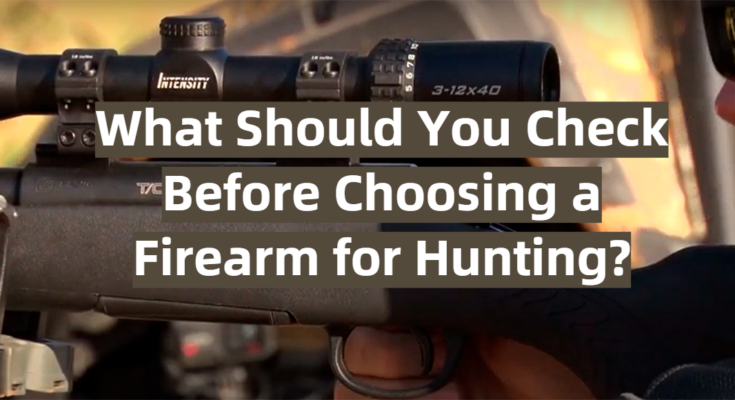Hunting is a time-honored tradition and a recreational pursuit enjoyed by millions of people worldwide. Yet, it’s imperative to remember that it is not a free-for-all activity. Legal regulations and requirements are in place to ensure safety, conservation of wildlife, and responsible hunting practices. When choosing a firearm for hunting, it’s crucial to understand and adhere to these legal requirements to have a safe, enjoyable, and lawful hunting experience.
Catalog
Considerations of Legal Requirements When Choosing a Firearm
1. Local Regulations Matter
Hunting laws can vary significantly from one place to another, and they often change over time. It’s your responsibility as a hunter to be aware of and comply with local hunting regulations. These regulations encompass everything from hunting seasons and bag limits to weapon-specific restrictions. They are typically set by state or provincial wildlife agencies or departments. To find the most up-to-date information, visit their websites, contact them directly, or consult with local hunting organizations.
2. The Necessity of Hunting Licenses
In many regions, obtaining a hunting license is a prerequisite for engaging in hunting activities. To acquire a hunting license, you may need to pass a hunter safety course, which often includes instruction on firearm safety and local hunting laws. Ensure you possess a valid hunting license and any required permits before setting out on a hunt. Violating this requirement can lead to hefty fines or legal consequences.
3. Selecting the Right Firearm for the Game
Selecting an appropriate firearm for your intended game is not only a matter of legality but also ethical hunting. Different animals demand different firearms. For instance, hunting waterfowl might require a shotgun with the appropriate choke and shot size, while big game hunting might involve rifles with specific caliber requirements. Using the wrong firearm for a particular type of game can lead to unnecessary suffering for the animal and potential legal issues. Seek guidance from experienced hunters or consult local hunting regulations for species-specific recommendations.
4. Compliance with Firearm Safety Laws
Firearm safety is paramount in hunting. Laws and regulations govern various aspects of firearm safety, including storage, transportation, and handling. Most states and provinces have strict guidelines on how firearms must be stored at home and transported in vehicles. Additionally, regulations often emphasize the importance of proper firearm handling in the field. Failure to adhere to these safety laws can result in fines, the confiscation of your firearm, or even criminal charges.
5. Respecting Firearm Restrictions
When selecting a firearm for hunting, it’s crucial to consider the legal requirements, Certain types of firearms may be restricted or prohibited for hunting purposes. These restrictions could include prohibitions on semi-automatic rifles for big game hunting, limits on magazine capacity, or caliber restrictions for specific game animals. It’s essential to thoroughly understand these firearm restrictions before purchasing or using a firearm for hunting. Ignorance of these regulations is not an excuse, and violating them can lead to legal repercussions and the revocation of hunting privileges.
6. Maintaining Proper Documentation
Keep all necessary documents up to date and readily accessible while hunting. This includes your hunting license, firearm registration, and any required permits. Law enforcement officers may request these documents at any time, and failing to produce them can lead to legal consequences. Staying organized and ensuring your paperwork is in order is a simple yet vital aspect of responsible hunting.
7. Participate in Hunter Education
Many states and provinces require hunters, particularly beginners, to complete a hunter education course before obtaining a hunting license. These courses cover essential topics such as safety, hunting ethics, and legal requirements. Even in areas where it’s not mandatory, it’s highly recommended to take such a course. It not only equips you with essential knowledge but also fosters a culture of responsible hunting. Being well-informed about hunting laws and ethics helps preserve the sport for future generations.
Conclusion
The Legal Requirements shown above are some of the things you must consider when selecting a firearm for hunting as hunting is not solely about personal preferences or shooting skills. It involves a comprehensive understanding of the legal requirements associated with hunting in your area. Ignorance of the law is not an excuse, and failure to comply with hunting regulations can lead to serious legal consequences.
Hunting is a privilege, and with that privilege comes responsibilities. By respecting local regulations, obtaining the necessary licenses and permits, selecting appropriate firearms, practicing firearm safety, and maintaining proper documentation, you can enjoy a safe, ethical, and lawful hunting experience. Ultimately, responsible hunting ensures the preservation of wildlife, the protection of natural habitats, and the continuation of this time-honored tradition for generations to come.



